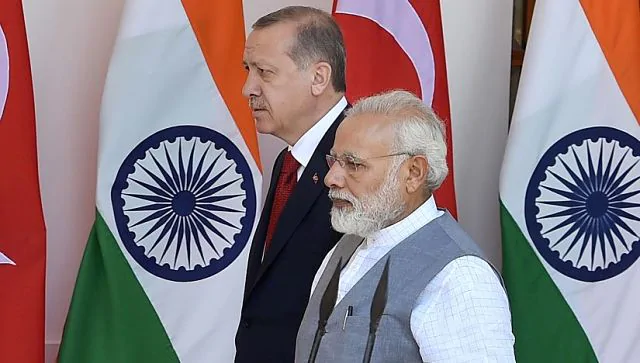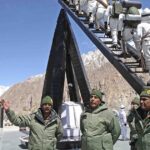
SOURCE: FIRST POST
The trans-continental bridge between civilisations, continents, religio-ethnicities and political-systems has afforded Turkey the rare spotlight to partake significant role, globally. No less than Napoleon Bonaparte had famously said, ‘If the world were a country, Istanbul would be its capital’. The Indian civilisation has connected with ancient Anatolia in Vedic times and the formal exchange of diplomatic missions between the Ottomans and the Mughals, dates back to 1481.
The intermingling of ethnicities in the Central Asian swathes also saw the raid and reign of Turkic Khalji dynasty over the Delhi Sultanate (1290-1320), amongst whose dominion was the notoriously bigoted, Allaudin Khalji (1296-1316).
Even the Mughals were Chaghta’i Turks and Baburnama was recorded in Turkish – though, the latter Mughals were more predisposed towards Persian and Hindavi, which incorporated the Persian culture of Sufism. The lingering Turkish imprint in the consciousness of the Indian-subcontinent was reignited in the 20th Century in the form of Khilafat Movement (1919-1924), a Pan-Islamist movement to restore the political authority of the Caliph of the Ottoman Caliphate.
Initially the Khilafat Movement conjoined Mahatma Gandhi’s non-cooperation movement with a promise for nonviolence, but instances like ‘Hijrat’ (exodus) from India to Afghanistan by 18,000 people and the Malabar Rebellion (1921) marred its promises, and then Mustapha Kemal ‘Ataturk’ abolished the caliphate in favour of a secular Turkey, by 1924. Thereafter, India’s own freedom struggle, tryst with destiny of a developing nation, sheer distance and co-secularity with Turkey, ensured minimal contact or dissonance — till the arrival of the revisionist and conservative Islamist, Recep Tayyip Erdogan, as the Prime Minister of Turkey in 2003, and now as the president, since 2017.
The Ummah (Muslim world) is witnessing tectonic changes, realignments and recalibration of sovereign aspirations that have pitted the traditional leadership of the Saudi-led Sheikhdoms against the Turkey-led, alternative ‘bloc’. This new divide in the restive Ummah goes beyond the sectarian prism of Shia-Sunni divide, as the Sunni-dominated Turkey, Qatar, Malaysia don’t seem to have any qualms in making case with the historical bête-noire of the Saudis i.e. Shia-Iran, to rattle the Saudi-led Sheikhdoms — in this power struggle, Pakistan is the perennial and patently unpredictable joker in the pack!
The psychological, economic, cultural and even religious imperatives ensured that Pakistan had remained steadfastly aligned to the Arab Sheikhdoms, over all other options. Once dubbed Saudi Arabia’s ‘closest Muslim ally’, Pakistan, has struggled to keep pace with the evolving dynamics, transformations and necessities of the 21st Century – today the Arab Sheikhdoms are reneging on religious puritanism, recognising the economic worth of India and normalising relations with Israel, to the discomfiture of Pakistan which remains fixated with the past. Despite Imran Khan personally charming and chauffeuring the Arab princelings, during their visits to Pakistan, the Saudi and the Emiratis bestowed their highest civilian awards to the Indian prime minister.
The Arab sheikdoms also displayed new-found disinterest in raking up Kashmir within the Organisation of Islamic Countries (OIC), snubbed terrorism and pretty much left Pakistan agenda-less within the Ummah. This inadvertent isolation of Islamabad has opened the tactical window for Erdogan to solace, coopt and the ensnare a drifting Pakistan into its alternative ambit, within the Ummah. The prospective optics of a coalition that entails ‘modernist’ Islamic countries like Turkey and Malaysia, energy-flush Qatar, polarising Iran along with the might of the only nuclear-armed Islamic country ie Pakistan, is a potent and intimidating combination.
Turkey recognises that in order to fructify its own agenda of dislodging the leadership of Arab sheikdoms within the Ummah, it needs to coalesce and pander to a very disparate, often contradictory and even specific agendas, that will allow it to stitch an alternative ‘bloc’.
Earlier in the year, Erdogan had openly said that the Saudis had ‘put pressure’ of withdrawing financial support to Pakistanis in order to deny Islamabad from joining a ‘rebel’ meet in Malaysia that seemed like a show of strength against the Arab Sheikhdoms, within the Ummah. While Pakistanis had grudgingly succumbed to Saudi pressures initially, they later found the Arabs dilly-dallying on their existential topic i.e. Kashmir, both unpalatable and unacceptable — a war of words broke out and finally the Arabs cut short their largesse towards Pakistan.
While opposition to Saudis for very different reasons, binds an Iran and Qatar respectively to Turkey (as does continued posturing against Israel) — Erdogan knows, the only key to bankrolling Pakistani support is ‘Kashmir’. Erdogan has presumably calculated and punted that the net benefit of propping Pakistan, at the cost of annoying India, is more beneficial from an overall Turkish profit and loss perspective. So, besides the ‘all weather friendship’ of China with Pakistan, Turkey has emerged as the only country that brazenly supports Pakistan at all multilateral forums.
Recently, Erdogan upped the ante on ‘Kashmir’ to the rare delight of Pakistanis at a speech at the United Nations General Assembly (UNGA), where he said, ‘The Kashmir conflict, which is also key to the stability and peace of South Asia, is still a burning issue’ and alluded to a possible solution, ‘in line with the expectations of the people of Kashmir’ — this, coming from a leader who has denied Armenian genocide, accelerated violence against minority Kurds and militarily expanded Turkish footprint from Libya to Syria, the duplicity and irony was lost on none! But realpolitik necessitates no consistency, rationality and certainly no morality, and Erdogan is playing a dubious selfish game, where ‘Kashmir’ is a recent, collateral and tactical, trump card!
The brief Arab Spring that shook the Sheikdoms into some course-correction saw the flight and succour of the ostracised Muslim Brotherhood ranks, to seek refuge in Turkey. Now Turkey is taking the religious high-ground within the Ummah to posit its ostensible commitment towards Palestine and Kashmir (attempting to discredit the Arab Sheikdoms on both), undertake populist-religious moves like the reconversion of the Sophia Hagia into a Mosque and publicly adorn a hostile and cavalier attitude towards the West and in particular, the United States.
From the history of Saudi Arabia and Iran to Pakistan, we learn that pandering to religious extremism in a bid to legitimise, then consolidate and finally expand sovereign ambitions is indeed a very slippery slope. Erdogan’s reckless political muscularity barely conceals the vulnerability of its societal, economic and moral underpinnings that besets the Turkish behaviour and reality, but for now, Erdogan is firing on all cylinders that could soon overheat and combust.
Clearly Erdogan’s gambit seems short-term, desperate and egomaniacal — as the glue that binds his ‘bloc’ is very transactional and fleeting, given its own vulnerabilities, contradictions and susceptibilities. Till then, like the wholly unnatural and tactical ‘friendship’ between a Communist China and Islamic Republic of Pakistan, the Turks under Erdogan will continue serving India their ‘Non-Delights’ on ‘Kashmir’, equally guilefully, vocally and selfishly.






